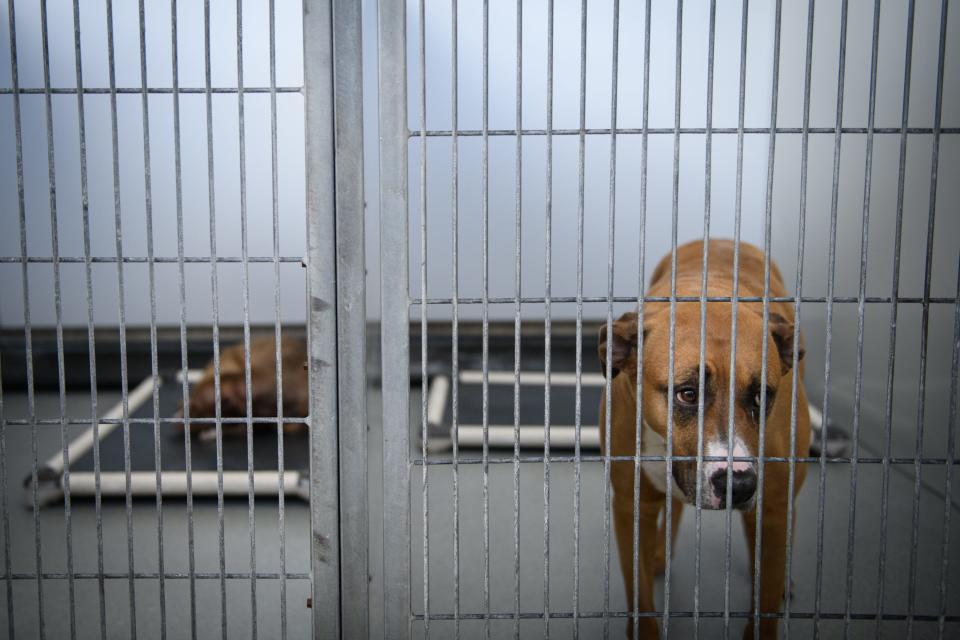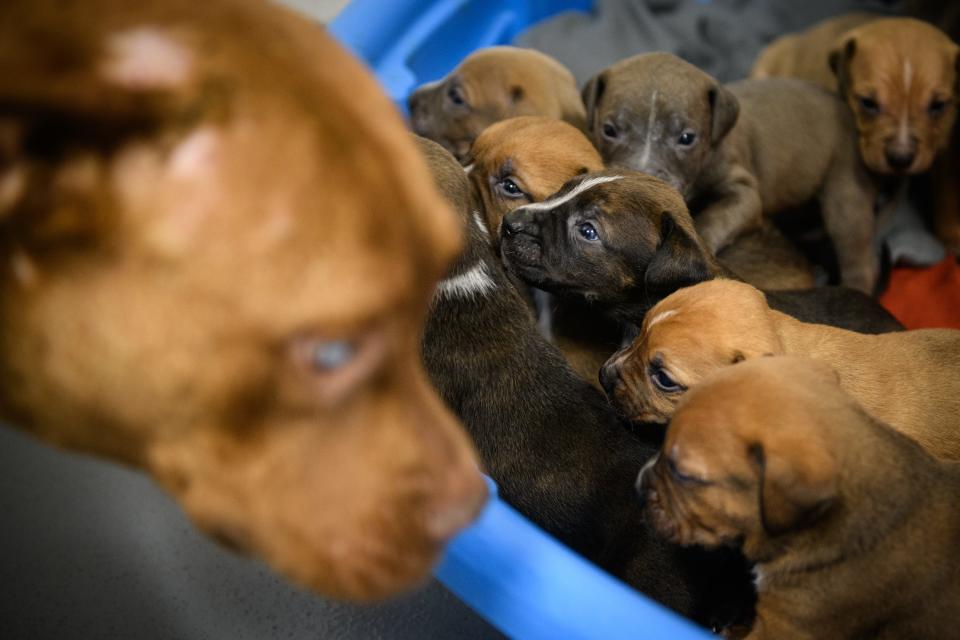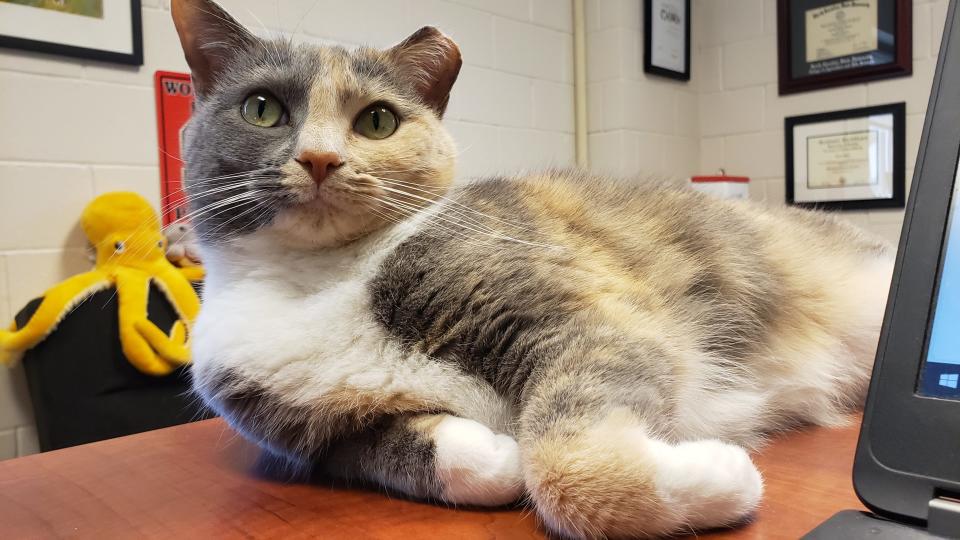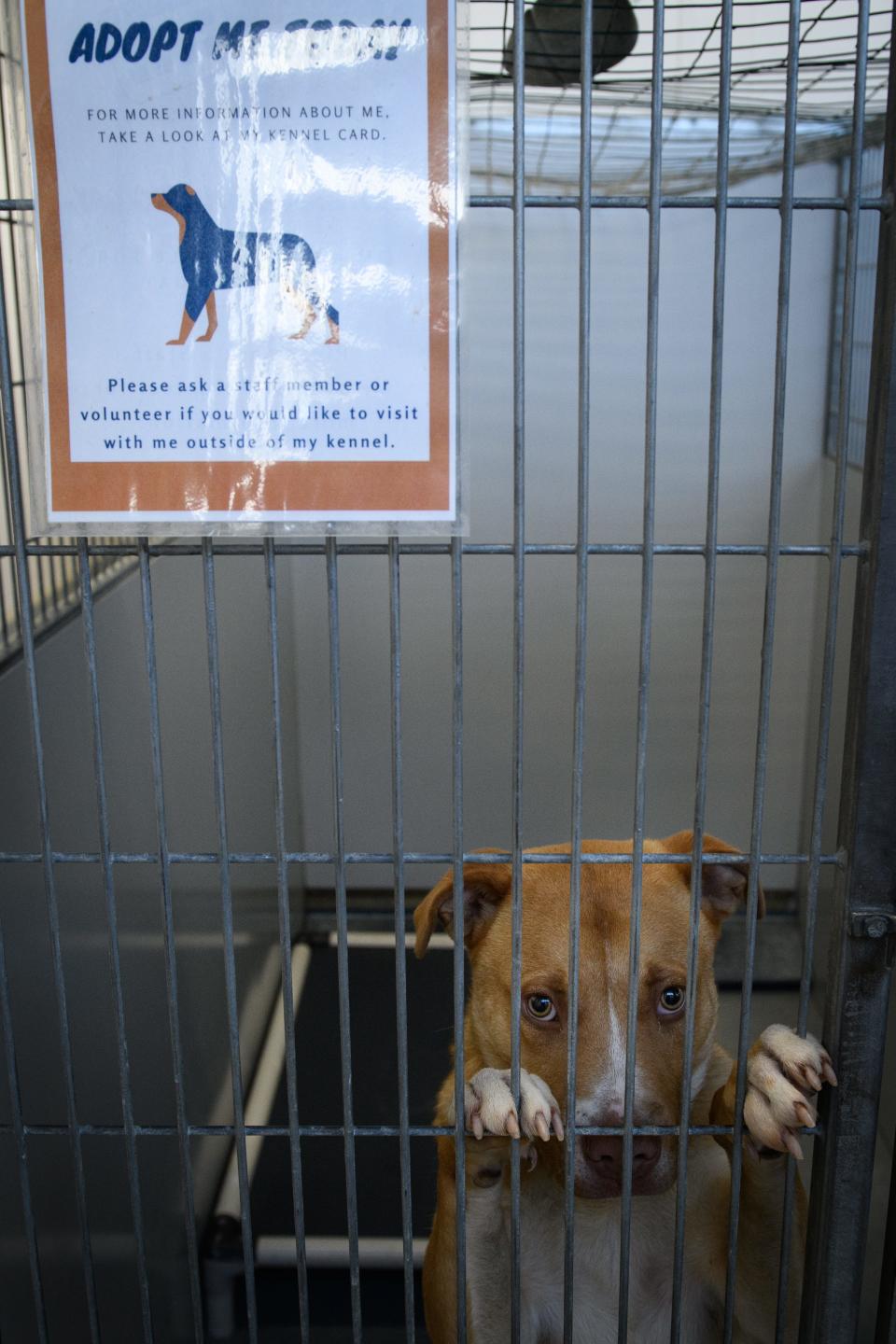Cumberland County shelter stays full, which leads to euthanasia. What can be done?
Last Thursday, I walked beside Elaine Smith down the row of caged dogs inside the shelter at Cumberland County Animal Services.
“Pit bull,” Smith said, indicating one of the dogs. Then she said “pit bull” for the next dog. She kept walking down the line, “pit bull, pit bull, pit bull.”
A whole line of pit bull or pit bull mixes is not unusual at the Fayetteville shelter on Corporation Drive.

Smith, the Animal Services director, calls pit bulls "great," said they tend to be friendly, and said she have two pits among their pet family of five dogs and nine cats.
But of the many breeds of dogs and mixes that come through their doors, pit bulls comprise between 60 and 70%. The stocky powerfully built dogs with an infamous reputation can be a challenge to adopt out, Smith said because many rental properties do not allow them.
“Military housing does not allow a lot of breeds, one of which is a pit bull mix,” Smith said.

Other rental spaces have weight limits for dogs, she said.
“There’s a lot of barriers for large dogs,” Smith said.
A struggle for space
The shelter is in a constant struggle for space.
In 2023, staff took in 7,358 animals. More than 4,200 were strays — brought in by residents or picked up by the team of animal control officers, which is currently understaffed by six positions, she said.
Other dogs and cats come to the shelter by various means: 2,167 were released by owners; 187 were abandoned; 80 were there because the owner was hospitalized; and 46 were born at the shelter, like the six puppies birthed by one of the shelter's pit bulls recently.
Puppies go fast; kittens are seasonal
We went to another part of the shelter where Smith showed me another new mom whose puppies were coated with brilliant speckles. Smith predicted they would go fast.
Puppies usually do.
The kittens ebb and flow. There were none at the shelter last Thursday, but that will change dramatically during “kitten season,” when Smith said it really gets bad from May through September.
“Cats are really good at making more cats,” she said. “They breed when it’s the ideal time outside.”

Pandemic puppies
I interviewed Smith in her office, as Sadie, a fluffy friendly cat with tan, white and gray fur, walked onto the desk. Like any kitty that has become part of an office family, Sadie felt she could go and lay anywhere. I dug it.
Smith said the COVID-19 pandemic led to a relatively quiet time for the shelter. She believes that’s because people were home with their pets, giving the pets fewer opportunities to roam.
“Our adoptions dropped, our intake dropped,” she said.
But when things started to open up again, the number of stray pets began to rapidly climb, she said.
Her opinion?
“People may have gotten that ‘pandemic puppy,’ but didn’t get theirs spayed or neutered because it was harder to get vet service," she said. “It’s fine for a while when you’re on lockdown. But now we have all those unaltered animals. We’re seeing a big rebound.”
The full bathtub
The shelter’s most heart-breaking statistic: 1,513 animals were euthanized there in 2023. Cumberland County is not the only shelter where there is a problem with too many animals; North Carolina euthanized 37,000 animals in 2022, according to state figures, the latest available.
The state has the second highest kill rate in the country, 14.3%, trailing only Mississippi, reports Veterinarians.org.
“It’s hard for the staff,” said Smith, whose background includes a tenure as shelter manager at Fayetteville Animal Protection Society, a no-kill shelter. “We are all very full — most of us here have a lot of animals. But yet we see pets every day.”
Some develop behavioral issues due to the confinement, she said.
The director said she is often asked why they cannot just build a bigger shelter. She uses an analogy of a bathtub.
“If the tap is running full out, and the drain can’t keep up with the tap, your tub is going to eventually overflow; it doesn’t matter how big your tub is,” she said. “Our intake of animals is greater than our outflow.”

They try different promotions to increase that outflow, like free pet adoptions last month. It was effective. She said, for example, it led to 30 adoptions on a recent Saturday, where normally there would be 10 or 12 on that day.
They have other promotions too, such as free adoptions for larger dogs. It all helps with the shelter’s critical need to, as Smith puts it, “make any space we can, everywhere.”
“We tried a name your price promotion,” she said with a smile. “People just seemed to be confused by it.”

Foster, even for a day
Smith and her staff are looking to the community for help. She has a pitch and she recites it with ease:
“If you can’t adopt, foster; if you can’t foster, volunteer. Help us walk dogs and help us with the moms.
“If you can’t do any of those things, donate.”
She said people can even foster for one day, thanks to the program, Dog Day Out, which started as an Eagle Scout’s project and includes a kit for someone who volunteers to take a dog to a park or somewhere and give them a respite from shelter life.
At the shelter, adoption fees are $100 for dogs and $70 for cats, and include the cost of vaccinations.
Why would owners not spay and neuter?
But what the shelter needs most is what the pets also need most — responsible ownership.
Smith said owners should not let their pets run loose and should get them spayed or neutered.
I asked Smith why would people not spay or neuter their pets. I had assumed it might be the cost.
But Smith’s answers surprised me. Some owners cited religious reasons, she said. Others did not want to permanently deny their pets a chance at being parents. Still others worried it would impact the pet’s health, or in the case of male dogs, change their nature.
“There is a lot of misinformation out there,” Smith said.
But she believes: “The public as a whole loves their animals, and they want to do the right thing for their animals.”
Owners who do not spay or neuter should keep the pets properly confined, she said. For large dogs, a fence is not enough, she said — there should be an additional enclosure. Pets should be kept inside while the owner is away, she added.
“It’s for your pet's safety, too,” she said.
A shelter dog meet-and-greet
Departing the Animal Services building’s adoption area, I saw a mom and her young son meeting a shelter pit bull handled by one of the staff members.
The mom, Charley, brought along their family dog, Doppy, to see how it would go between him and Jolene, the shelter dog, whom the family saw online.
“They’re doing great,” said Charley, who added they had two cats and an aquarium, too.
She came all the way from Wilmington.
“I’ve always loved pit bulls,” she said. “They’re my favorite.”
Myron B. Pitts can be reached at mpitts@fayobserver.com or 910-486-3559.
This article originally appeared on The Fayetteville Observer: Fayetteville, Cumberland County shelter dealing with 'pandemic puppies'

